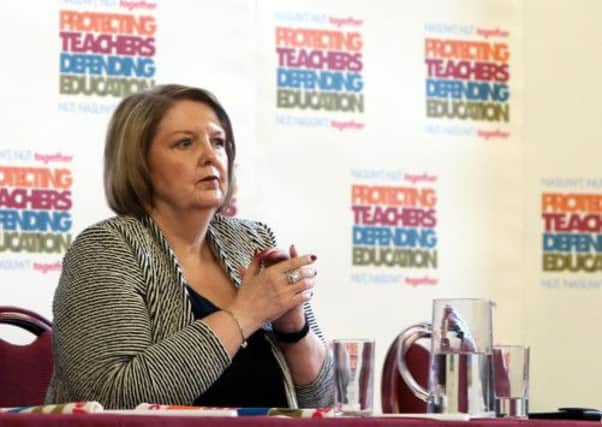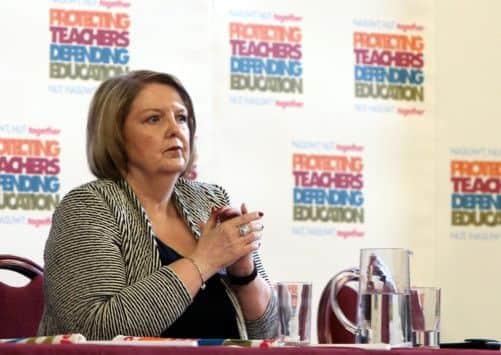Yorkshire teachers to strike next month


Two teaching unions have announced that their members in eight areas of England will strike in October. Thousands of pupils in hundreds of schools are likely to be affected.
A national walkout is likely to follow before Christmas.
The new strikes, on two days in October, are the latest move in the campaign by the National Union of Teachers (NUT) and the NASUWT over Government education reforms.


Advertisement
Hide AdAdvertisement
Hide AdThe Government has condemned the unions’ rolling campaign of walkouts and said it is disruptive to pupils’ education.
NUT and NASUWT members in the East Midlands, West Midlands, Yorkshire and Humberside and the Eastern region will take part in a walkout on October 1, the unions announced.
Those in the North East, London, the South East and the South West will strike on October 17.
Education Secretary Michael Gove wrote to both unions in March to say he was willing to meet them to discuss their dispute, but also insisted that the ‘’direction of travel’’ on both their key issues was ‘’fixed’’.
Advertisement
Hide AdAdvertisement
Hide AdUnder the Government’s reforms, due to come into effect from this autumn, teachers’ pay will be linked to performance in the classroom - with schools setting salaries rather than following a national framework.
Changes have also been made to public sector pensions.
NUT general secretary Christine Blower said: “Teachers begin the academic year with an enormous level of enthusiasm to do the best they possibly can for every child that comes into their classroom.
“This year that enthusiasm is tempered and dampened by the anger and frustration teachers feel.
“That’s why, even though at the beginning of the academic year the last thing teachers want to be doing is contemplating strike action, there’s no choice this year other than to move in that direction, given the brick wall they are facing from Education Secretary Michael Gove.”
Advertisement
Hide AdAdvertisement
Hide AdNASUWT general secretary Chris Keates said: “This is not a reckless rush to strike action. We have been trying to engage with Mr Gove since he came to office.
“No one wants to be disrupting children’s education. Our experience is parents understand that if you attack teachers’ pay and conditions you are putting at risk children’s education.”
The unions accused Mr Gove of “megaphone diplomacy”, using public platforms to denounce them, and industrial action rather than engaging to discuss the issues.
A Department for Education spokeswoman said: “It is disappointing that the NUT and NASUWT are striking over the Government’s measures to allow heads to pay good teachers more.
Advertisement
Hide AdAdvertisement
Hide Ad“In a recent poll, 61% of respondents supported linking teachers’ pay to performance and 70% either opposed the strikes or believed that teachers should not be allowed to strike at all.”
Ms Keates said the unions were asking Mr Gove to meet “a very low hurdle” of a programme of meetings with the unions.
Brian Lightman, general secretary of the Association of School and College Leaders (ASCL), said: “We fully understand and share the frustration of those teachers who reluctantly decide to take industrial action.
“While ASCL and the teacher unions have different views on the best way to resolve disputes with the Government, we all are united in campaigning for the fairest working conditions and remuneration for teachers and school leaders.
Advertisement
Hide AdAdvertisement
Hide Ad“Historically, ASCL has never taken part in industrial action because we prefer other ways of influencing policy. Our members have taken the view that this approach is more effective and more compatible with their roles as leaders in schools and colleges.”
Mr Gove hit back at the NUT and NASUWT, accusing them of being responsible for attacking teaching.
In a speech in central London, he acknowledged that sometimes it could appear that he was criticising teachers but insisted that “nothing could be further from the truth” and he wanted to defend the profession from “critics and cynics”.
“There are attacks directed at teaching - and I want to fight them.”
Advertisement
Hide AdAdvertisement
Hide AdIn too many ways and by too many people, the importance of teaching is being denied, Mr Gove said.
He told the Policy Exchange event: “The first attack on teaching comes - perhaps surprisingly, perhaps unsurprisingly - from the leadership of the two biggest classroom unions.”